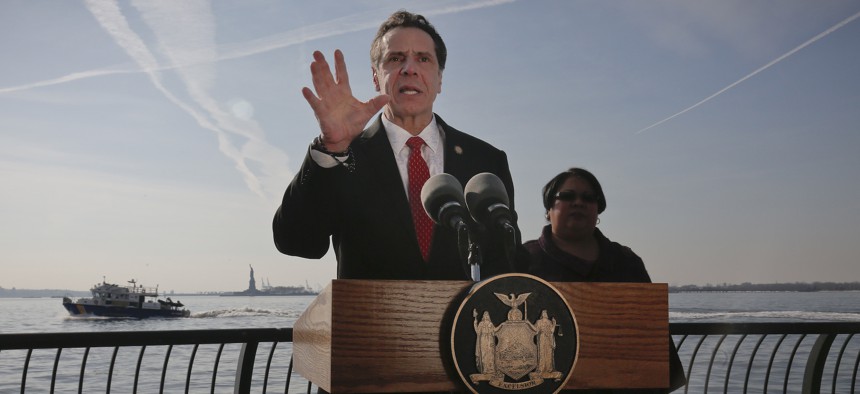State and Local Jurisdictions Step Up to Fill Federal Void During Shutdown

New York Gov. Andrew Cuomo holds a press conference with the Statue of Liberty in the distance behind him, Sunday Jan. 21, 2018, in New York. Bebeto Matthews / AP Photo

Connecting state and local government leaders
As the impasse continues on Capitol Hill, some governors vow action to keep national parks open with their own resources.
Although congressional negotiations on Sunday night failed to resolve the lapse in appropriations that prompted the shuttering of parts of the federal government this weekend, the disruption hasn’t yet had major impacts on U.S. city halls and state capitals. But as the congressional impasse continues into Monday, some state and local jurisdictions have stepped up to fill parts of the federal void where they’ve been able to.
In New York state, Gov. Andrew Cuomo announced this weekend that the Statue of Liberty and Ellis Island, both operated by the National Park Service and subject to closure due to the shutdown, would remain open.
In Arizona, Gov. Doug Ducey pledged state resources to keep Grand Canyon National Park open to the public, The Arizona Republic reported. “If Washington, DC won’t function. Arizona WILL. Don’t change your travel plans. Count on it,” Ducey tweeted on Friday.
In the nation’s capital, the District of Columbia Mayor Muriel Bowser said that the Department of Public Works would assume responsibility to emptying trash containers along the National Mall. Unlike most U.S. cities, much of the parkland in the nation’s capital is under the jurisdiction of the federal government.
“Leadership is about stepping up, not shutting down,” Bowser said in a statement on Friday. “Shutdown or no shutdown—D.C. is open.”
As Government Executive reported this weekend, the Trump administration is trying to minimize the impacts of the shutdown by allowing federal agencies to tap left-over funding from previous appropriations to keep some of their operations up and running during the impasse.
Just like during the 2013 federal government shutdown, federal parks are bearing the immediate brunt of the lapse of appropriations, but the Trump administration isn’t keeping the public from accessing the national parks this time around. But good luck finding a restroom, which has been a problem in California.
According to the San Francisco Chronicle:
Park visitors were able to access most public lands, even benefiting from waived entrance fees at Yosemite, which invited people in while closing its entrance stations and sending home the rangers who collect the tolls. But visitor services were curtailed at parks nationwide, which sometimes came with a different price.
“She wanted to use the bathroom,” said San Jose resident Nes Ab, 29, who was visiting Muir Beach with his friend Krista Katzenmeyer, 24, and found the parking lot closed and the restrooms locked. “I didn’t expect this.”
Katzenmeyer added, “If you’re going to shut down the government, at least leave the gates open.”
RELATED on Government Executive:
Michael Grass is Executive Editor of Government Executive's Route Fifty and is based in Seattle.

NEXT STORY: Federal Tax Changes May Prompt State Tax Overhauls





